|
Strand Street
Sandwich
1304 613388
http://www.bellhotelsandwich.co.uk/
https://www.facebook.com
https://whatpub.com/bell-hotel

Above photo circa 1880, and stating the name W H Boyer, which may have
been the photographer. |
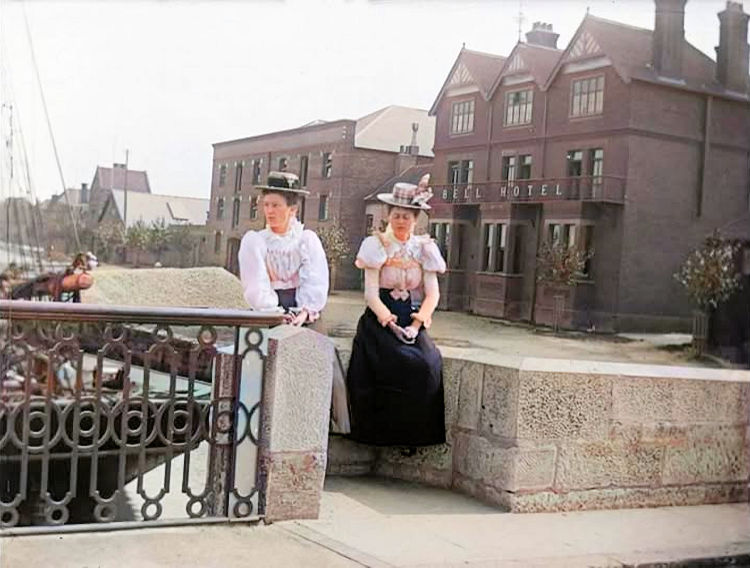
Above photo, dated 25 August 1896, showing the Great-Great Aunts of Alec
John, Lotty and Elizabeth, outside the hotel. |
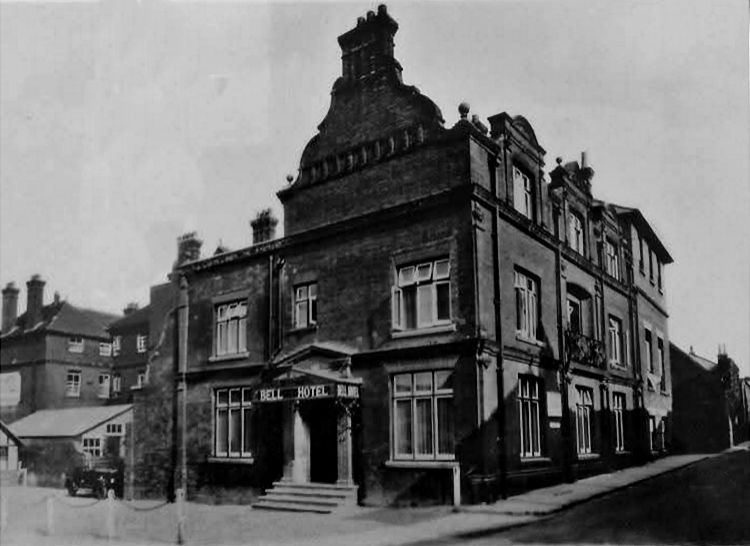
Above photo, date unknown. |
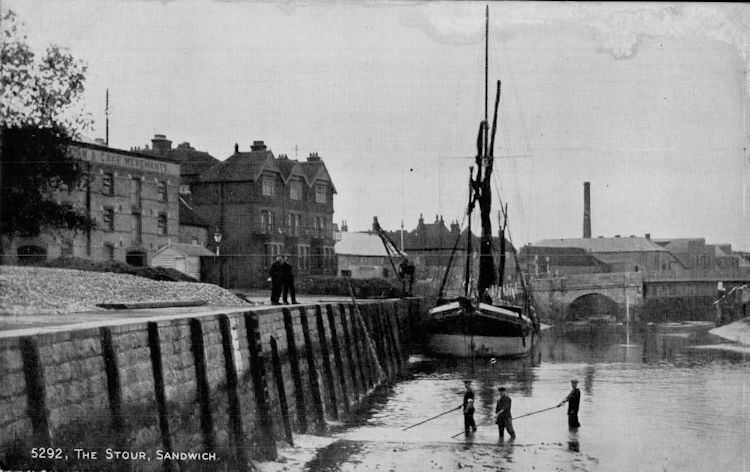
Above postcard, date unknown. |

Above postcard, date unknown. |
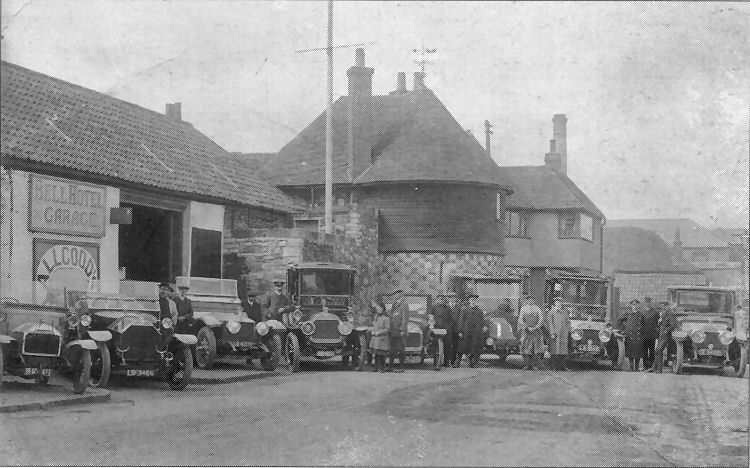
Above photo pre 1926, showing an array of cars outside the garage of the
"Bell Hotel" at Sandwich Barbican. The reason for the gathering is not
known, but a chauffeur stands beside each car at a time when motoring
was still only for the wealthy. The garage was pulled down in 1926.
(Audrey Lowley - Whitfield WI) |
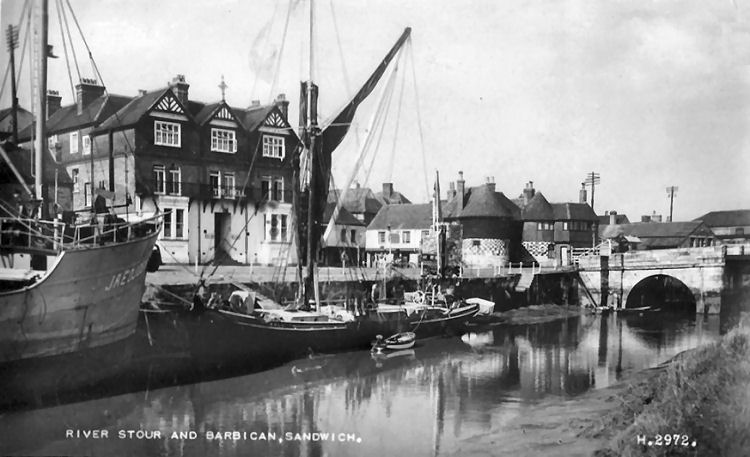
Above postcard, circa 1939, kindly sent by Rory Kehoe. |
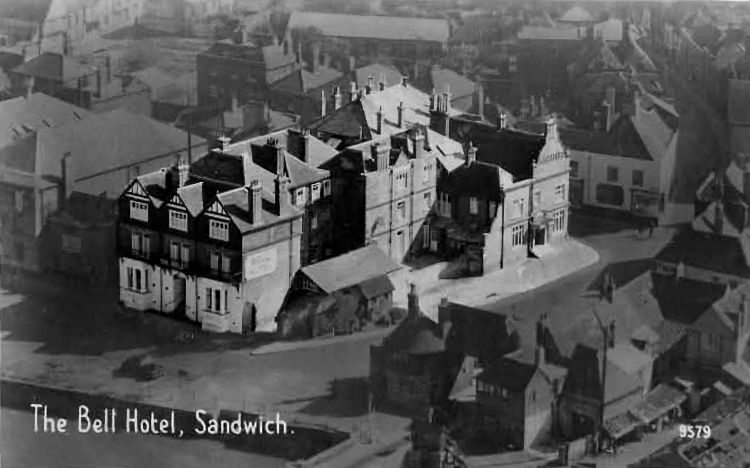
Above postcard, date unknown. |

Above photo, showing people at a function regarding the Curfew Bell
circa 1960s. |

Above photo, date unknown. |
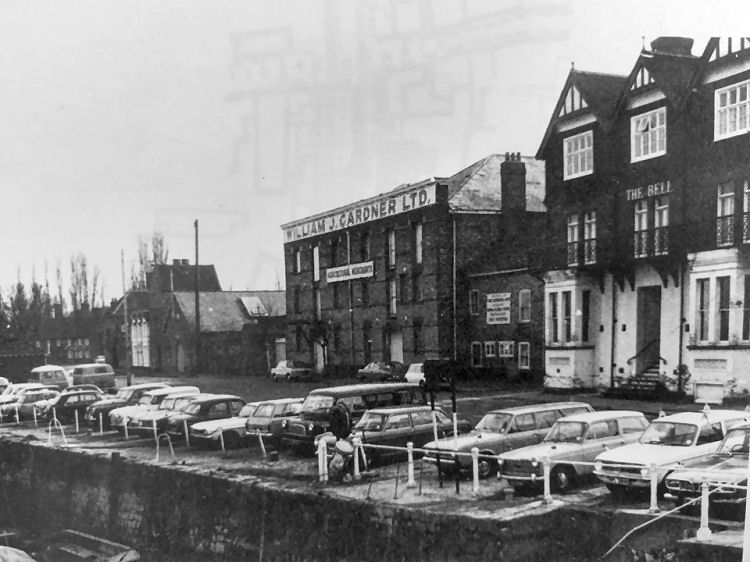
Above photo 1973. Kindly sent by Paul Wells. |
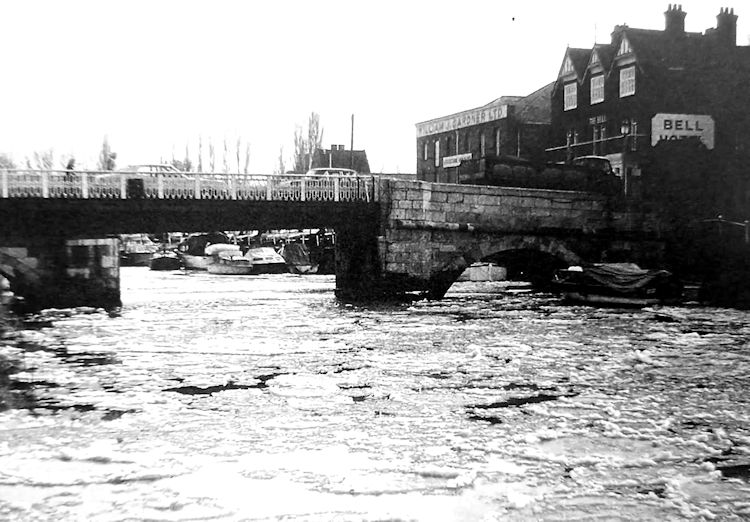
Above photo, 1976. |
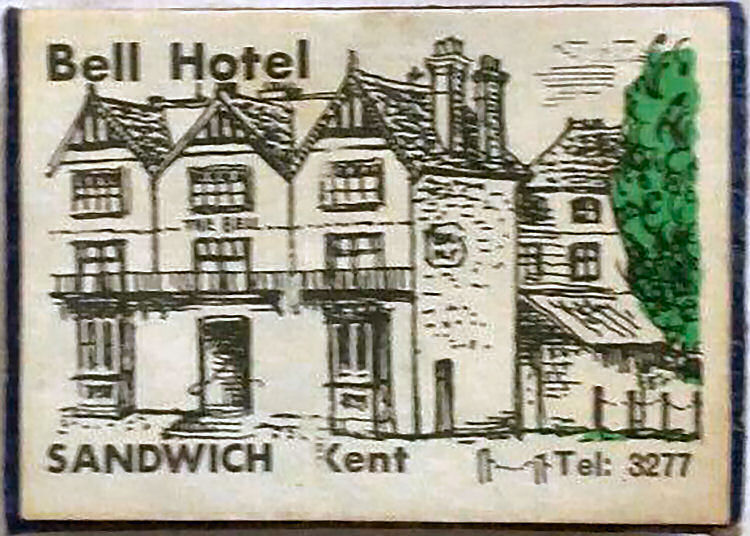
Above matchbox, date unknown, kindly sent by Debi Birkin. |
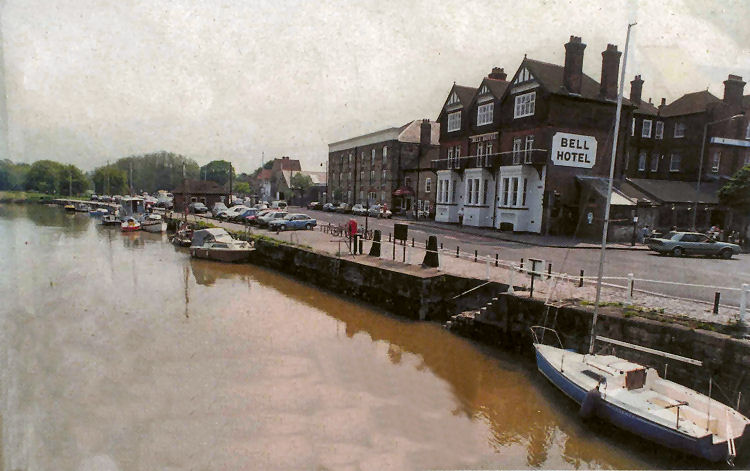
Above photo 1998. From the Dover Mercury. |

Above photo, date unknown. |

Above showing advertising leaflet 1909 when the hotel was sold by
auction. Showing the current entrance then being the billiard room, and
the "Stour Inn" was where the club rooms were. |
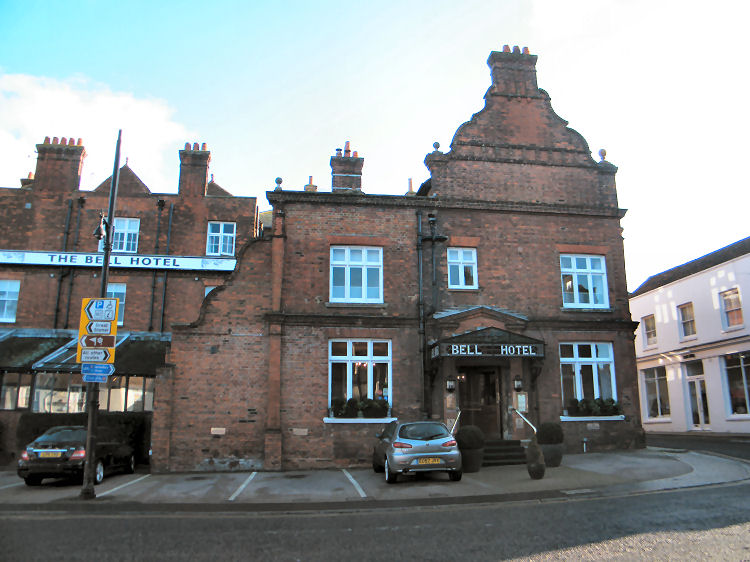
Above photo by Paul Skelton 14 January 2012. |
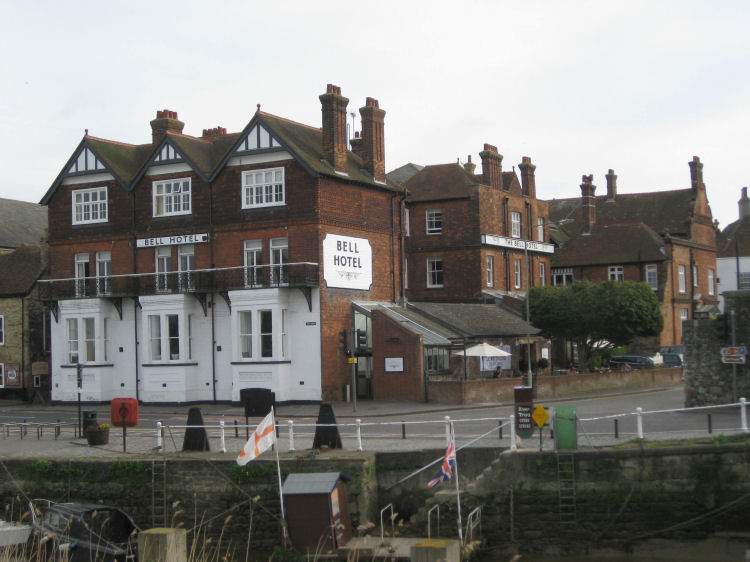
Above photo taken by Patricia Streater, 28 April, 2010. |
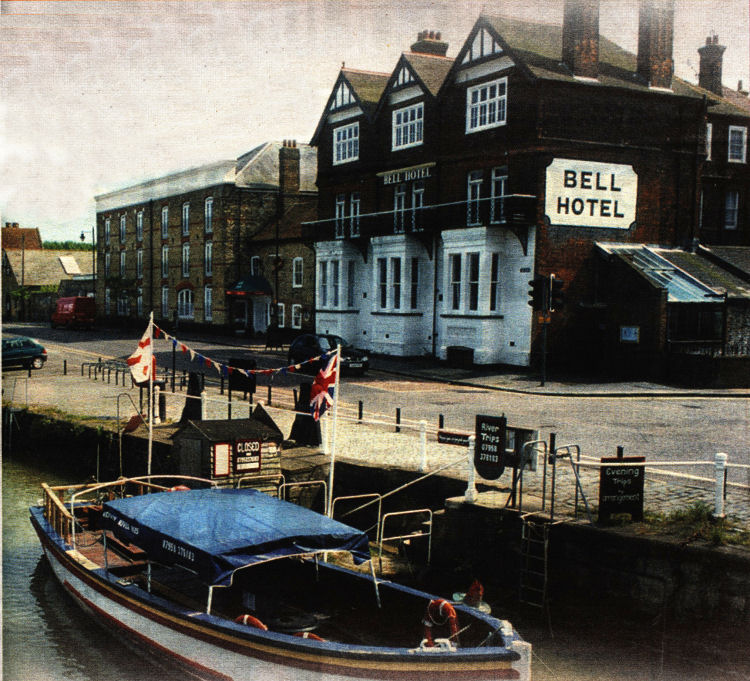
Photo from Dover Mercury 15 March 2007.
|
|
From an email received 19 August 2020.
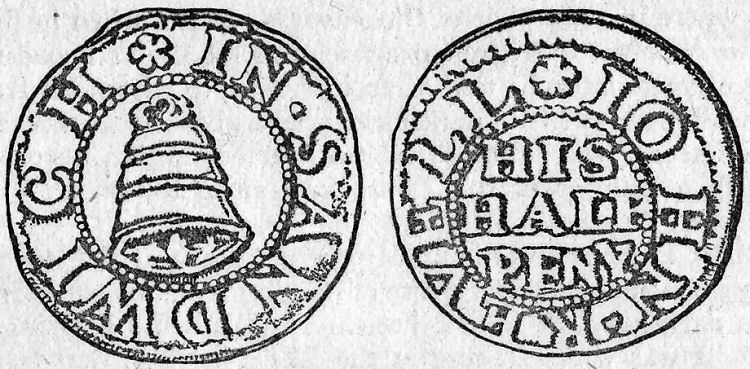
John Revell, landlord of the original "Bell Inn" during the 1650s &
60s, was a direct ancestor of mine, my great x8 grandfather. His
descendant Ann married my Great-great grandfather at St. Laurence in
1861.
John and his wife Alice had four children, all baptised at St. Mary’s
in the town 1649-59; John died in 1670, his wife in 1673. It was
probably he or she who poured the glass of sack for the Mayor to give to
the new King Charles II who with his brother James, Duke of York visited
the town in 1660. The Revells were still in the town in numbers in the
late 19th century.
Regards,
Mike Mirams.
|
|
From the Kentish Gazette or Canterbury Chronicle,
Wednesday, 3 May, to Saturday 6 May, 1769. Price 2½d.
TO BE SOLD
A large quantity of very good old Oak Timber of different Scantlings,
some of which is Thirty Feet in Length, being Part of a Tenament now
taken down, near the “Old Bell Inn,” in Sandwich.
Enquire of Mr. Samuel Paramor, Carpenter, in Sandwich.
|
|
Kentish Gazette, September 2 to 6, 1791. Kindly sent from Alec Hasenson.
The Bell, Sandwich, has been taken over from Mrs Sarah Harrison by Mr. John Friday.
|
|
From the Kentish Gazette, 27th Nov 1821.
MEAD's Bankruptcy
All persons indebted to the estate of Thomas MEAD of Sandwich,
innkeeper, a bankrupt, are desired within 21 days from the date hereof,
to pay the amount of their debts to William CURLING, wine merchant or
Charles PORTER, baker, the assignees, or they will be sued for the
amount without farther notice.
Sandwich Nov 26 1821.
(However, Thomas Mead is shown as licensee in the 1823 edition of
Pigot's directory.)
|
|
Kent Herald, 17 November 1825.
Freehold public houses, and other Estates, in Sandwich.
For sale by auction, by Messers. Pott and Denne, at the "Bell Inn," in Sandwich,
on Monday, at 12th day of December, 1825, at 11 of the clock in the Forenoon
precisely, the following very desirable Freehold Public Houses and Estates,
situate in the town and port of Sandwich, in the county of Kent, in separate
lots, Viz:-
The "Three Colts," public house.
The "Sun" public house.
The "George" public house.
The "Salutation" public house.
The "Crispin" public house.
The "Dolphin" public house.
The "Black Bear" public house.
The "Green Posts" public house.
The "King's Head" public house.
The "King's Arms" public house.
The "Ship" public house, with cottage and premises adjoining.
The "Swan" public house, with a Stables used therewith, and a cottage in Delf
Street, adjoining.
The "Two Brewers," public house, with cottage adjoining.
The "Bell Inn and Tap," with Assembly Rooms, coach house, and stables, &c.
The "Three Kings Inn," with dwelling house adjoining, and extensive stabling,
&c.
The "New Inn," with Assembly Room, Theatre, Stables, Yard, &c.
The Dwelling Hand School Rooms, in Delf Street, in the occupation of Miss
Stuart.
A Drwlling House in Delf Street, with Malt House and Cottage adjoining.
A Malthouse near Moat's Hole.
A new built Messuage or Tenement, in the occupation of the Widow Solley.
A Messuage or Tennament, in Strand Street, adjoining the "Crispin," in the
occupation of Richard Ewell.
A Messuage or Tenement, in two dwellings, in Locksboat Street, in the occupation
of Henry Farmer, and George Jeffrey Edmunds.
A Stable, with Lofts over the same, and large Garden, Summer House, and
Premises, on the Great Quay, near Quay Gate, in the occupation of Thomas Mead.
The Premises may be viewed on application to the respective tenants, and printed
particulars had, seven days prior to the sale, of the Auctioneers, and at the
office of Mr. Noakes, Solicitor, Sandwich.
|
|
Kent Herald, 15 December 1825.
An extensive sale of estates, consisting of various freehold public houses and
other property, took place in the town and port of Sandwich, on Monday last. It
may not be uninteresting to give the amount for which each house sold.
The "Three Colts" £780.
"Sun" £550.
"George" £405.
"Salutation" £540.
"Crispin" £750.
"Dolphin" £335.
"Green Posts" £365.
"King's Head" £455.
"King's Arms" "£900.
"Ship" £510.
"Swan" £860.
"Three Kings" £710.
The "Bell, with Tap," &c. and Assembly Rooms, since sold for £2,000.
The "New Inn," "Two Brewers," and "Black Bear," did not sell.
Mr. Noakes was the Solicitor and Messers. Pott and Denne, of sandwich, were the
auctioneers.
|
|
Kent Herald, 29 December 1825.
Marriage.
Sunday, at Charlton near Dover, Abraham Bishop, waiter at the "Bell Inn,"
Sandwich, to Miss Sarah Longley.
|
|
From the Kent Herald, 24 August 1826.
Bell Inn, Sandwich.
To be disposed of, that oldest established in, called the "Bell," in the town of
Sandwich, with a New Assemble Rooms, Coach-houses, Stables, Outbuildings, Yard,
and Premises, now in the occupation of Mr. Thomas Mead; together with a Dwelling
House, adjoining the same, and fronting the Great Quay, called the "Bell Inn
Tap," now occupied by Edward Miles.
Apply to Mr. John Wyborn, Jail Street; or two Mr. Noakes, Solicitor, Sandwich.
|
|
From the Dover Telegraph and Cinque Ports General
Advertiser, Saturday 4 January 1834. Price 7d.
WHEREAS a Fait in Bankruptcy
is awarded and issued against WILLIAM KINGSFORD of Buckland, near Dover,
in the County of Kent, paper manufacturer, miller, dealer and chapman,
and being declared a Bankrupt is hereby required to surrender himself to
the commissioners in the said Fait named or the major part of them, on
the sixth day of January next, at one o'clock in the afternoon
precisely, and on the Fourteenth day of February next, at Twelve o'clock
at noon precisely, of the same days, at the "BELL INN", SANDWICH, in the
County of Kent; and make full discovery and disclosure of his Estate and
Effects; when and where the creditors are to come prepared to prove
their debts, at at their first sitting to choose Assigners; and at the
last sitting, the said Bankrupt is required to finish his examination;
and the Creditors are to assent to, or dissent from, the allowance of
his certificate. All persons indebted to the said Bankrupt, or that have
any of his Effects, are not to pay or deliver the same but to whom the
Commissioner shall appoint, but give notice to Mr SURRAGE, Solicitor,
Sandwich; or Messrs. W and E DYNE, Solicitor, 61, Lincoln's Inn Fields,
London.
|
|
From the Kentish Gazette, 24 January 1837.
NOTICE.
That a Meeting will be held at the "Bell Inn," Sandwich, at One o’clock
in the Afternoon, on WEDNESDAY DAY, February the First, for the general
transaction of the business of the DEAL and SANDWICH MEDICAL CLUB, and
for the purpose of receiving the contributions of the Voluntary and
Benefiting Members of the said Society, when the Stewards for the
respective parishes are particularly requested to attend, or to send
their quarterly accounts to the Secretary.
W. M. HARVEY, Secretary and Treasurer.
|
|
From the Kentish Gazette, 18 February 1840.
Sandwich.
(The following was in response to Queen Victoria's recent marriage to
Prince Albert on 10 February 1840. Paul Skelton.)
At daylight the bells sent forth a merry peal, and continued at
intervals throughout the day. Flags were hoisted on all the churches,
and on the ships lying in the river. In the evening a band paraded the
town. A ball and card assembly was held at the "Bell Inn," and a large
party met at the "King's Arms," to celebrate the occasion.
|
|
Kentish Gazette, 15 October 1844.
BELL INN, SANDWICH.
MRS. HADLOW begs most respectfully to inform the Inhabitants of SANDWICH
and its Neighbourhood, that her House-warming
Dinner will take place on FRIDAY next, the 18th Inst., when the company
of any Gentleman will he esteemed a favour.
Ticket, including Dessert and Waiters, 5s.
Dinner on Table at Four o’clock precisely.
|
|
From the Dover Telegraph and Cinque Ports General
Advertiser, Saturday 22 February, 1845. Price 5d.
The Mayor gave his annual dinner at the "Bell Inn," on Tuesday last,
to the members of the Corporation. The evening was enlivened by the
excellent singing of Messrs. Powell and Pettman; and the spread upon the
occasion was, in every way, worthy of our respected mayor. Great credit
is due to the worthy hostess for the manner in which the dinner was
provided.
|
|
From the Kentish Gazette, 27 May 1845.
PROVINCIAL INTELLIGENCE.
INSOLVENT DEBTORS COURT, May 17. IN RE THOMAS SQUIRE.
The insolvent had kept the "Bell Inn," at Sandwich, and was opposed on
the part of Messrs. Hart, wine-merchants, on the ground that he had
concealed or made away with considerable property.
The insolvent was required by an order, made on the 9th of December last
(since which time he has stayed in prison), to pay into Court £450,
being a portion of a sum which he alleged he had paid his relations, out
of the sale of his public-house, including £300 to his brother-in-law,
Daniel Tapley, a farmer residing at Barham Court, Dover. The insolvent
swore to the payment of the money for advances obtained at different
periods, and Tapley as positively denied that there was the least
pretence for the statement. The evidence was painfully interesting. The
insolvent and his brother-in-law stated that what each had said was
untrue. About 13 years ago Tapley said he lent the insolvent £25, which
he had repaid in two months afterwards.
Mr. Commissioner Pollock thought an opportunity should be given to the
insolvent to consider the tissue of fraud and perjury committed; he was,
perhaps, not aware of the statement to be made, and in common charity he
should have permission to consider his conduct.
Mr. Dowes, who opposed, said Tapley had previously made an affidavit in
which he denied the alleged loan, or repayment by the insolvent. The
Learned Counsel prayed the Court to adjourn the case until the money was
forthcoming.
Mr. Commissioner Pollock adjourned the case until the 28th of June.
There was a limit fixed by the Act, otherwise he knew no limit for such
a case. He urged on the insolvent to consider his statement.
The insolvent said he could not alter his evidence.
The case was adjourned.
|
|
Kent Herald, 5 June 1845.
Sandwich.
Mr. Thomas Squire, late of the "Bell Inn," Sandwich, was opposed in the
Insolvent Court, on the 17th instant., on the part of Messers. Hart, wine
merchants, on the ground that he had concealed or made way with considerable
property. The evidence was of a very conflicting nature, between the insolvent
and his brother-in-law, relative to some money transactions; and the case was in
consequence adjourned to the 21st of June.
|
|
Kent Herald, 10 July 1845.
Thomas Squire appeared for judgments, in the Insolvent Deptors' Court on
Saturday. He had kept the "Bell Inn," at Sandwich, and to account for the
disposition of the proceeds, alleged that he had made several payments to
relations. among them D. Tapley, residing near Dover, was stated to have been
paid £300, but he denied the allegation, which, however, was persisted in by the
insolvent. The case stood over in mercy of the debtor to consider his statement,
and it was now mentioned that he had no allegation to make, and appeared for
judgment.
Mr. Commissioner Pellock said he fully believed that the sum had been either
concealed or made away with, and that the insolvent had invented the story which
the court had heard to account for the money. The insolvent was ordered to be
imprisoned for two years from the vesting order.
|
|
From the Kentish Gazette, 16 June 1846.
BELL INN. SANDWICH.
TO BE SOLD BY AUCTION, By Mr. Hicks,
ON the Premises, Strand Street, SANDWICH, on WEDNESDAY, the 24th day of
JUNE, 1846, and Two following Days, the HOUSEHOLD FURNITURE, Plate and
Plated Goods, Linen, China, Glass, Horses, Carriages, Wines, Patent
Mangle, Fixtures, and other Effects of the above Establishment:—
Comprising mahogany four-post and tent bedsteads and furniture's, feather
beds and bedding, with suitable furniture for twelve bed rooms, mahogany
dining, card, Pembroke, tea, and side tables, Brussels and Kidderminster
carpets, hearth rugs, register and other stoves, two large kitchen
ranges, smoke jacks, copper, lead pump cast iron fenders, fire irons
handsome set of 18 mahogany Trafalgar and other chairs, pier glasses,
sofa, window curtains, large quantity of glass and blue ware, china
bowls, plate, and plated goods, linen sheets, table cloths, towels,
doyleys, numerous kitchen requisites in copper, iron, and tin ware,
knives and forks, three brass barrelled single-motion beer engines,
horse-shoe dining table, with extra boards and tresses, large meat
safe, gas pipes and fittings, lamps, patent mangle, &c. &c.
Yard and Stables:— Three useful post horses, four-wheel chariot in
excellent condition four-wheel phaeton, two sets post harness, two gig
ditto, two pair long traces, saddle, bridle, chaff cutting machine,
ladder, horse cloths, stable implements, quantity of corn, hay, and
straw, measures, corn chests, and other effects.
The Cellar contains a small stock of choice port, sherry, and other
wines and spirits.
May be viewed on the mornings of he days of Sale when Catalogues, 6d.
each, may be had on the premises, or of the Auctioneer, Market-street,
Sandwich.
|
|
London Gazette Friday November 20 1846.
Re: Squire, an Insolvent Debtor.
The creditors of Thomas Squire, formerly of the "Duke of Cumberland," in
the parish of Barham, near Sandwich, next of the "Bell Inn," Sandwich both
in the county of Kent, Innkeeper, next of West Hougham, near Dover, in
the county of Kent, and next and late for a short time of the "Catherine
Wheel Inn," High-street, borough of Southwark, Surrey, at both last-named
residences not in any business or employ, an insolvent debtor, are
desired to meet the assignee of his estate and effects, appointed by the
Court for the Relief of Insolvent Debtors on Thursday the 10th day of
December next, at twelve o'clock at noon precisely, at the offices of
Messrs. Dimmock and Burbey, No. 11, Clements-lane, Lombard-street,
London, in order to assent to or dissent from the said assignee
compromising and arranging, on terms to be then and there stated, a
legacy or interest under the will of Mark Sandford, deceased, to which
the said insolvent became entitled in right of his wife, on the death of
Elizabeth Tapley, now lately deceased.
Dated this 17th day of November
1846. |
A Hotel has been on this site since the 1300s although the present
building is mainly 19th century.
This building dates from 1648. In 1769 I have found reference to it being
called the "Old Bell Inn" and assume that it is the same. Unless
of course this refers to an even earlier building.
Pigot's Directory 1823 & 1839 referred to the "Bell" as a posting and commercial
hotel, latter date run by Thomas Matthews and Mary Maylon.
Melville's directory of 1858 states that the Bell Inn in Strand Street
also housed the Assembly Rooms.
The Bell Hotel has been an important centre of Sandwich life since Tudor
times. A Bell Inn has existed on The Quay, adjacent to the Barbican Gate and
Toll, overlooking what would have been the harbour, now the River Stour,
since about 1300. Known as the "Bell Tavern" in the 17th century.
The present listed building is mainly 19th century. Today
with its 34 en suite bedrooms; a Georgian regency room catering for up to
120 guests; the Stour conference suite overlooking the river, a brasserie
with a menu specialising in local produce and two bars, that importance is
set to continue as The Bell undergoes a programme of refurbishment and
restoration.
In 1648, during the last months of the Civil War, a fake Prince of Wales
stayed at the hostelry, and received enthusiastic support from the Royalists
among the townspeople. This impostor, whose name was Cornelius Evans, was
finally caught out and sent packing to Canterbury Jail. In 1660 the real
Prince of Wales, now King Charles II, came ashore at Sandwich with his
brother James, Duke of York, Prince Rupert and the Earl of Sandwich, to make
their way by road to Deal.
The Merry Monarch King Charles II was presented with a glass of sack
(spicy wine) at the door of the Bell by the Town Mayor on his way to Dover
to receive Queen Henrietta Maria, on her return from exile, which he drank
without dismounting. There was a minor incident when a stray dog bit a horse
of the King's retinue.
Bagshaw Directory 1847 describes the inn as a Posting House.
Today, 2012 the hotel is owned and run by Shepherd Neame and offers 37
individually decorated ensuite bedrooms, a choice of two function rooms and
a restaurant capable of serving 100 guests.
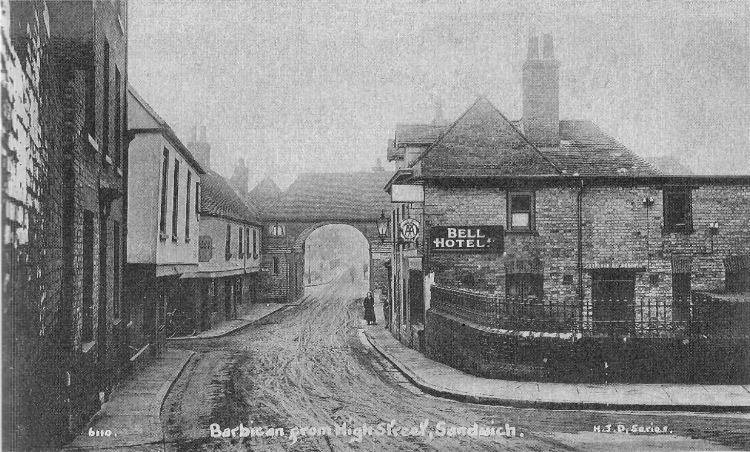
Above photo circa 1905 doesn't show the Bell Hotel but show Allgoods
cycle and motor shop, a private house, garage and a cinema. The sign
shown is actually pointing the direction of the actual hotel.
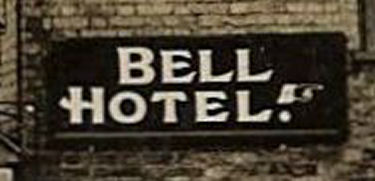
The AA as shown on the sign on
the building was formed on 29 June, 1905. The buildings on the right were demolished during the 1920s.
|
|
From the Kentish Gazette, 26 September 1865.
SANDWICH.
DESIRABLE FREEHOLD PROPERTY AND SANDWICH GAS SHARES.
TO BE SOLD BY AUCTION, BY MESSRS. HICKS AND SON, At the "Bell Inn," Sandwich,
ON WEDNESDAY, the 4th day of October, 1865, at Two o’clock In the Afternoon, IN
SIX LOTS.
Lot 1:— A FREEHOLD PUBLIC HOUSE, known by the sign of the "Forester’s Arms,"
situate in Bowling Street, Sandwich, in the occupation of Richard Corney.
And also TWO FREEHOLD DWELLING-HOUSES adjoining, with excellent cellar
thereto, situate in Strand Street, Sandwich, in the occupation of James Sutton
and Elizabeth Denne.
Lot 2:— A well-planted GARDEN with the GREENHOUSE and BUILDINGS thereon, in
Strand Street aforesaid, adjoining the last-mentioned Premises, in the
occupation of Richard Harrisson, Esq.
Lot 3:— A substantial well-built WAREHOUSE or STORE, capable of holding a
large quantity of corn or other merchandize, situate in the Bowling Street
aforesaid, in the occupation of Charles Emmerson, Esq.
Lot 4:— A good walled GARDEN, situate in the rear of the last Lot, and now in
the the occupation of the said Charles Emmerson.
Lot 5:— A CHAISE-HOUSE and three-stalls STABLE in Bowling Street aforesaid,
adjoining the last Lot, and now in the occupation of Richard Dadds.
Lot 6:— Ten SHARES of £10 each in the Sandwich Gas Light and Coke Company.
The Premises may be viewed on application to the several Tenants, and a part
of the Purchase Monies may remain on Mortgage if required.
For further Particulars and Conditions of Sale apply to the Auctioneers,
Market Street, Sandwich, or to Messrs. Surrage and Emmerson, Solicitors,
Sandwich and Deal.
|
|
From the Southeastern Gazette, 3 July 1866.
BELL TAP AND STABLES, SANDWICH.
MR. WILLIAM ADAMS begs to inform the gentry and public in general who
attend Sandwich Market, as well as the numerous Commercial Travellers
who frequent this town, that he has SUCCEEDED to the BUSINESS lately
carried on by Mr. Dray, at the above address, and hopes, by civility and
strict attention to his customers, to merit a continuance of the favours
that have been so largely bestowed on his predecessors.
|
|
Kentish Gazette 06 October 1868.
TO BREWERS, INNKEEPERS, RETIRED PUBLICANS, AND OTHERS.
Mr. V. J. Collier, will sell by auction, at the Mart, Tokenhouse
Yard, London, on Friday October 9th 1868, at One for Two o'clock.
The "Bell Inn," at Sandwich, an old established and respectable
Commercial and Family Hotel, containing good accommodation, including
billiard and assembly rooms, extensive stabling and tap, of freehold
tenure and let on lease for an unexpired term of 13 years at £75 per
annum. The beer trade of the hotel and tap is reserved, and the lessee,
who is also the occupier, is open to an offer for his interest; thus the
property offers an equally eligible investment to either a brewer,
innkeeper, or other person seeking a well secured income arising from
Freehold Property. |
|
From the Deal, Walmer, and Sandwich Mercury,
14 September, 1872. 1d.
DRUNK AND RIOTOUS
John Jordan, George Durban, and William Hoile, three youths, were
summoned upon the information of Supt. Brothers, with being drunk and
riotous in the streets on the night of Saturday week, August 31st.
Jordan pleaded guilty to being drunk, but denied that he was riotous,
and Durban and Hoile said they were not drunk.
John Burch, the landlord of the "Bell Inn," deposed: I saw the
defendant John Jordan in my house between 15 and 20 minutes past eleven
on the night in question. In came in with several others, accompanied by
Supt. Brothers. All the men were exceedingly rough and violent, and they
demanded to be served with ale, and the defendant was decidedly not
sober. The language used by the men was very bad, but I did not hear
them use any threats. They had an idea that my house was allowed to be
open after others. My front door was closed and the shutter up when the
men all rushed in. I had closed my house that night at 10 minutes to
eleven, and everybody in the house but myself had gone to bed. I was
waiting till the last train had come in. The men demanded the lights to
be extinguished throughout the house, and some gravel was thrown at my
bedroom window. There were 30 men at least and they were all disorderly.
I refused to serve them, and got them out of the house as quickly as
possible. They thought some of the authorities were using the house, and
Supt. Brothers requested me to let him go through the house in order to
satisfy the mob. After the men got out of the house they remained in the
street and made a great noise - yelling and shouting.
Cross-examined by Jordan: I have a distinct recollection of your
being in my house on the night in question.
By Durban: I have no recollection of your being in my house, nor do I
remember your calling for a glass of ale, and I did not serve you with
one.
Durban: I did not go into your house and ask for a glass of ale.
Hoile had no questions to ask.
Supt. Brothers said: On Saturday the 31st of August shortly after
eleven o'clock, there were a number of men assembled in front of the "Sun,"
public-house, and they were making a great noise. The three defendants
were the most prominent. They were cursing and swearing. Jordan had a
stone bottle (a gallon one I should imagine) over one of his shoulders,
Hoile was endeavouring to conceal his face, and Durban had the brim of
his hat turned down for the same purpose. The mob went on up through the
Chain and down the High Street. They said they were certain there were
houses in the town which had permission to keep open after hours, and
one of the mob said, "Let us go down to the "Bell."" I told him the
"Bell Hotel" was closed, but they would not believe it, and I therefore
accompanied them there. When we got there, Durban went towards the door
and he said the bar was open. He then went in and called for a glass of
ale. I heard him do so. I did not observe whether Jordan entered the
house, but he was amongst the mob, and he said he did not care for the
______ Magistrates, and that he knew some of them were playing
billiards. I consider that he was the principle offender. After we got
the men out of the "Bell," they remained in the street for a long time,
but when the clock struck 12 they cooled down.
In defence Jordan said: I have nothing to say only that I am sorry I
was there, and I hope it will never occur again.
Durban: I was not drunk, thought brothers says I was - I was no more
drunk than I am now.
Hoile: I went in the country, and I was coming home I tied my
handkerchief round my neck as I had a sore throat. When I got into town
I fell in with the mob, and I was pushed first one way and then another.
I was not drunk or disorderly.
There was another summons against the defendant Jordan, and the
Magistrates decided to hear the evidence in this case before considering
their decision in the other.
Jordan was then charged by Supt. Brothers with being drunk in the "Three
Colts," public-house, on the night of the 1st of September, and of
riotous and disorderly behaviour.
Click here for
continuation.
|
|
From the Deal, Walmer, and Sandwich Mercury,
7 July, 1900.
FATAL ACCIDENT TO MAJOR HARBY.
Tuesday was a day which will never be forgotten by the members of the
1st Cinque Ports, a most lamentable accident occurred, which caused the
death of the second-in-command of the Regiment, and cast a gloom over
the entire Camp. Major Harby mounted his horse before breakfast to
proceed to Sandwich, in order to pay a visit to Lieut. Lane, who, having
been thrown from his (Major Marby's) horse the previous day, was at the
Cottage Hospital at Betteshanger. He intended, also, to meet the
detachments from the different companies, who were to arrive by early
trains for the inspection. He had not proceeded far before the horse
threw him, but he soon re-mounted, and proceeded out of Camp. The animal
was very fresh and restive, and as he approached the gate, by the
head-quarter guard, he was again thrown, and the horse bolted towards
Sandwich, turning into the road leading to the St. George's Golf Club
House. two of the gunners ran after and caught the horse, the Major
following, and stating that he had not received any injury. He again
mounted and rode into Sandwich, and when in New Street, the horse ran
away with him. Major Harby tried to pull the animal up, when it reared
on to the pavement at the corner of New Street and Galliard Street, and
he was pitched violently against the house, falling heavily on the
pavement, and bringing down the window shutter with him in his fall.
When picked up, he was found to have received serious injuries to the
head, and he was taken to the surgery of Surgeon Captain Harrisson close
by. On examination, it was found that he had sustained a severe cut on
the head, and that hios shoulder was dislocated. He was taken to the
"Bell Hotel," and later in the day he lost consciousness, and died about
noon. The terrible news was brought to the Commanding Officer as the men
were marching off the parade ground after the inspection; the Union
Jack, which was flying at the Guard tent, was lowered to half mast, and
the sad tidings quickly passed from one to another, until the entire
Camp was in a state of consternation. Major Harby was without doubt the
most popular officer in the regiment. Enrolled in No. 2 Company, Dover,
as a gunner, he very soon gained, by merit, the position of bombardier,
and afterwards, corporal, when he took a commission in the Corps as
Lieutenant, and was promoted step by step, until at the time of his
death he was the senior Major, and had he lived another year, in the
ordinary course of events he would have been promoted to the commander
of the regiment on the retirement of Colonel Daniel. Major Harby was
held in the highest esteem by every member of the regiment, from the
Colonel downwards. he was a most efficient, and at the same time a most
popular officer. he had a kind word for every one, no matter his rank or
station in life, and there was never an officer of the 1st Cinque Ports
who so thoroughly won the hearts of every member of the corps. He will
be greatly missed by officers, non-commissioned officers and men alike,
and his loss is deeply deplored. The horse which was the cause of his
death belonged to an ex-sergeant of one of the Dover Companies, and the
Major had had it in camp three years in succession. It was a collar
horse, but had been with a trooper under training in the east Kent
Yeomanry. Owing to the weather the previous day it had very little
exercise, and was fresh when taken from the stable. The same animal
threw Lieut. Lane when exercising it on Monday. The Lieutenant sustained
slight concussion, but was able to present at the inspection on Tuesday.
The inspection was held by Col. Baker, Commanding Militia and
Auxiliary Artillery, S.E.D., who afterwards expressed himself much
gratified with what he had seen. He was pleased that they had mustered
so strong, and with the general turn out, and particularly with the
march past, which was very well done. He noticed that there was a marked
improvement in the way in which the equipment was fitted, and in the
general appearance of the men.
The death of major Harby has entirely upset the arrangement of the
camp. The official dinner, which was to have taken place the same
evening was indefinitely postponed, the concert will not take place on
Thursday, and it is very probable that the camp will break up at the end
of the fortnight.
THE INQUEST
Was held at the "Bell Hotel" the same afternoon at 4.30, by Dr. F. W.
Hardman, Coroner for Sandwich and its Liberties. The following were
sworn on the Jury:- Messrs. Herbert Hicks (foreman), Francis W. Lass,
James Howard, Arthur w. Chapman, Joseph W. Carr, William W. Woodruff,
Harry Forbes, F. Walter Pain, Albert Yarrow, A. Jordan, George Arnold,
and Walter E. Fagg.
The Jury having viewed the body, Reginald A. Bullock, proprietor of
the "Three Colts," said that at
about 7.45 that morning he was in his house when he saw the horse and
rider gallop violently past, proceeding down New Street from the
direction of the station. he rushed out and saw them come into contact
with Sackville House. The rider was thrown with considerable force
against the shutter, which fell with him, and the horse also fell, but
immediately got up and rushed off in the direction of Mrs. Fagg's
stable, where it had been kept. The occurrence was so instantaneous that
he could not say which part of the deceased came into contact with the
shutter. Witness went across and held the injured man's head on his arm,
and undid his jacket collar. The deceased was then groaning. He could
not speak at first, and seemed partially unconscious, but when witness
bathed his temples with vinegar he murmured to him to detest. Witness
sent a man immediately for a doctor. Several people then came round, and
deceased walked with assistance to Dr. Harrison's surgery, and then sat
on the door step. The horse was certainly running away with its rider
when he first saw them. As witness held deceased, blood was coming from
the back of his head. It appeared to witness that the deceased officer
endeavoured to guide the animal straight down New Street, but it would
not go, and was no doubt making for Mr. Fagg's stables.
Stephen Bingham, in the employ of Mr. Farley, of Dover, said he was
acting as groom, the horse being owned by Mr. Farley. It was about 12
years of age as near as he could tell. He had always known it to bear a
good character, and never remembered the horse running away with anyone
before. He had frequently ridden it himself.
Questioned by the Coroner, witness said it threw another officer the
day before, who was galloping across the camping-ground. That was caused
through the stirrup-strap breaking. The horse had been used to town
work, and also saddle work twice a year for the Yeomanry and Volunteer
Camps. It had run in a milk-cart twice a day while at home, and was not
a spirited or awkward horse for a stranger to have. Nothing led him to
expect an accident. There was no intention at any time of killing the
animal. It had a very tender mouth. It was in good condition, and had
only had its usual feeding up to the time of going to the camp. The
Major had ridden the horse occasionally for five years, and this was the
third camp at which he had had it. Witness rode the horse from Dover to
the camp last Thursday morning, and he would not mind riding it back,
but he had orders to box it on account of the bridle being broken. The
Major was a good rider as far as he knew.
Asked by the Coroner if the animal was likely to be more trying in
camp than out, witness replied that probably it would be. He took the
horse to the camp about seven that morning, and afterwards saw the
deceased, who was going for a ride to Betteshanger. From what he had
heard, the deceased came by the road by the "Lord
Warden" Stables, intending to cross the railway, but the horse would
not go, and turned round, and went towards the town, and deceased then
used the spurs. While with witness the horse had never shown any
particular signs of temper, unless when passing a traction-engine or
motor car.
In answer to questions by several jurors, the witness said a horse of
that description was not used to a rider wearing spurs, and deceased
should not have used them. The horse would not have the spurs or the
curb-bit. The deceased knew of this, and he was cautioned on Thursday,
and witness had been warned not to use either when started from Dover.
Dr. Harry Kerswell deposed that he was called about a quarter to
eight. When the call came, he was in bed, and he immediately dressed,
and when he went down, the deceased had reached the surgery. His
injuries consisted of a scalp wound on the left side, and a skin
abrasion about three inches long on the right side of the head, and the
left collar bone was fractured. He complained of great pain in the
shoulder. He seemed dazed, but was not unconscious. The wounds were
dressed at the surgery, and the collar bone was set after his removal to
the "Bell." Deceased got no better. Witness did not suspect any injuries
beyond those that were apparent. About an hour and a half after the
accident, depression came on, and deceased got drowsy. When witness left
him, at about 11.30, having occasion to go to the surgery for something,
deceased was about the same as when he saw him first at the surgery, but
on his return to the hotel he found him dead. There were two other
medical men with the deceased the whole time. He expired about 12
o'clock. In witness' opinion, death was caused by compression of the
brain, due to intracranial haemorrhage, occasioned by the rupture of a
vessel in the brain. The compression would not be noticeable at first.
Col Daniel was then called to give evidence of identification. The
deceased was 38 years of age. Col. Daniel remarked that he considered
the horse was somewhat skittish. It was a safe horse in the hands of an
experienced rider, and Major Harby had the making of a good rider, with
any amount of pluck.
The Coroner, in summing up, said it was clear from the circumstances
which the evidence brought to light, that the groom took the horse to
the camp on Thursday, and the major had ridden the horse at various
times the past five years, whilst twice a year it had been used for
Volunteers and Yeomanry training. he stated that it showed no signs of
vice, and had never thrown anyone before, although it was of a nervous
character when passing traction-engines and motor cars, and he also
implied that the deceased had been warned not to use the spurs or the
curb rein. The deceased's experience of riding did not appear very
considerable, although he had had lessons when he was appointed Major.
The deceased was a personal friend of his, and he knew him to be a man
of considerable nerve, and who was not likely to have lost his head. He
appeared to have intended riding to Betteshanger, and on passing out of
the road by the "Lord Warden" directed the horse's head towards the
railway, but the horse insisted on going in an opposite direction, and
probably, on the Major using the spurs, the animal bolted with him. At
the Galliard Street corner he appeared to make another effort to control
the horse, and in the struggle between the horse and man they came into
collision with the house, the deceased receiving the injuries described,
the horse running away to the stables. He did not think that blame
attached to anyone. The deceased evidently attempted to unwisely coerce
the horse by the use of the spurs, and he thought the jury could only
find that death was caused accidentally. He commended Mr. Bullock for
the prompt aid which he rendered. As he had previously said, the
deceased was well know to him, and to a great many, and was very
popular. He felt that Major Harby's loss would be greatly deplored.
The jury returned a verdict of "accidental death," and the4 foreman
said he had been desired to express on behalf of the jury the deep
sympathy they all felt with the relatives, and also with the officers
and men in the loss of so able an officer.
After the inquest on the body of Major Harby on Tuesday evening, his
remains were placed in an elm shell, and at nine o'clock were removed
from the town. The officers, Sergt-Major Hewlett, Quarter-Master
Sergeants Smith and Beau, the Sergeant-instructors, and those of the
sergeants who had become acquainted with the fact, assembled at the
"Bell Hotel," and the staff-sergeants and sergeants were permitted to
once more look at the face of their late esteemed officer, whose remains
were then carried on the shoulders of six sergeants, from the bedroom to
the hearse on the Quay, the pathway being lined with officers,
non-commissioned officers and men, who saluted the corpse passed. The
shell was covered by the Union Jack. The Colonel and other officers
accompanied the body, by road, to the residence at Dover.
On Wednesday, the general orders contained the following:- "The
Officer Commanding, desires to take the earliest opportunity of
expressing his deep sorrow and regret, which will be shared by all
ranks, and the sad and lamentable accident which had deprived the
regiment of one of its most popular and efficient officers, in the
person of Major Harby, whose indefatigable services during the present
camp have contributed so greatly to its success, and whose death while
in the actual performance of his duties, leaves a blank in the regiment
which will now be difficult to supply." All life seems to have been
taken out of the camp, and only the necessary routine was undertaken. On
Wednesday, Nos. 2, 3, 4, and 8 companies, and on Thursday, Nos. 5, 6,
and 7 companies went to gun practice at the South Lines, Dover,
excellent practice being made - the best, in fact, that has been made by
any auxiliary regiment mobilised up to the present this year. The
companied left in camp each day practised with the 40-pounders, at No. 2
Battery. The time will be occupied on Friday and Saturday in a similar
manner, and in consequence of the death of Major Harby, the camp will be
struck on Wednesday next, instead of on the following Wednesday.
Prior to the detailed companies leaving for gun practice, at Dover,
this (Friday) morning, the regiment was paraded, and Captain Bradley,
addressing the men, said that they were assembled in consequence of the
regrettable death of Major Harby, and in order that a letter from Mrs.
Harby might be read to them. The letter was as follows: "Mrs. Harby
wishes to thank the officers, and all ranks, for their kind sympathy,
and hopes that the death of her husband will not effect the enjoyment of
the camp, as she feels sure that that would be the wish of her husband."
Captain Bradley went on to say that he knew if the Colonel had been
present, he would have expressed to them the very deep sorrow he had
felt in the terrible loss the regiment had suffered from the lamentable
death of Major Harby. He knew it had been felt throughout the regiment
by all ranks. Major Harby had been in the regiment a great many years,
serving from a gunner to the rank he held at the time of his death; and
through every rank he was popular, and he would be very greatly missed.
He knew, too, that sympathy of the regiment was with Mrs. Harby in her
troubles.
The funeral takes place today (Friday), at Dover Cemetery, and will
be of a private character, by the wish of the family, but the whole of
the officers of the regiment will attend, and the remains of the gallant
Major will be bourne to their last resting-place by the sergeants, one
from each company.
HOW THE NEWS WAR REACHED AT DOVER
On the Town Council assembling on Tuesday, the Mayor said: I think
that after the sad intelligence we have received this morning, we will
adjourn the business over till next week. It has really quite
overwhelmed me, and I am sure the sympathy which I feel, you share with
me. (Here, here). I refer to the lamented death of Major Harby, who is
really one of our Corporation officers. he was deeply interested in
everything that tended to the welfare of the town, and it is a sad
circumstance that he should be cut off in the prime of life, and more
especially while he was doing his duty as a soldier. I propose that an
expression of our deep sympathy be forwarded to Mrs. Harby and the
family. I also move that the business be adjourned for the week.
Mr. Mackenzie seconded, and Mr. Martyn Mowll and Ald. Peake having
spoken, the resolutions were carried unanimously.
On the suggestion of Mr. Mackenzie, a telegram was sent to Col.
Daniel, commanding 1st C.P.V.A., to the following effect:- "The Mayor
and Corporation, on behalf of all inhabitants, desire to express their
deep sympathy on the occasion of the lamented death of Major Harby."
|
|
Canterbury Journal, Kentish Times and Farmers' Gazette 02 November 1901.
SANDWICH.
Mr. Rudyard Kipling paid a brief visit to Sandwich last week, staying at
the "Bell Hotel."
|
|
Hull Daily Mail 17 June 1907.
Mr. Minter, 75 years old, a solicitor, of Folkestone, committed suicide
by shooting himself on Sunday at the "Bell Hotel," Sandwich.
|
|
From the Dover Mercury, 15 March 2007.
COME and meet our specialist wedding exhibitors
including florists, tailors, bridal wear companies, photographers,
toastmasters, jewellers, harpists, a Kent Marriage Registrar offering expert and friendly advice and our own in-house Wedding
Adviser. Enjoy canapés and sparkling prosecco from our 'place at the
bell' brassiere. Guided tours through the refurbished and redecorated
hotel including the Regency and Stour Rooms and the white wedding bedrooms.
The historic Bell Hotel is licensed for
weddings. Its elegant double height Regency Room with deep original Georgian sash
windows and Minstrels' Gallery is a perfect setting for a wedding reception for up to 100 guests. The Stour room, with deep windows high ceilings
overlooking the river, is licensed for the wedding service and will hold
up to 60 guests. Our 'White Bedroom' is the
romantic room for this most special of days.
The head chef of our
brassiere 'The Place at The Bell" will create a wedding menu that is simply delicious.
Seafood and fish straight from Sandwich bay, lamb from
nearby Romney Marsh and vegetables, salads and herbs supplied by
local farmers. Nothing too fussy and fancy, just the freshest
ingredients simply cooked to bring out their fullest flavours. We use
local free range and organic products whenever possible, change the menu according to
the seasons and always
have an interesting selection of vegetarian choices. We offer wines from
new regions that are never predictable or boring, including some from
Kent and Sussex vineyards, as well as local ales and juices. Choose from
three different types of menus: a canapé/crostini selection, our buffet
collection and a 'table service' menu.
The Bell Hotel Sandwich has 34
individually decorated bedrooms, including 3 larger suites. Some
bedrooms have balconies and views over the River Stour or the Kent peg
tiled rooftops of
the old town.
The Cinque Port of Sandwich is arguably the most complete
medieval historic town in
England. The Guildhall and Town WaIl, The Butts, The Ropewalk, Millwall,
The Bulwarks, The Fisher Gate, The Barbican and Tollbridge
over the River Stour are all redolent of its historical wealth and
importance. Thomas a Becket passed through Sandwich on his flight from
Henry Il, Richard the Lionheart landed at Sandwich on his return from
the crusades. The Black Prince brought King John of France back as
prisoner from his victory in Poitiers and Elizabeth I was entertained in
Sandwich, to try to persuade her to help restore the harbour when it
started to silt up and the town's fortunes went into decline. Sandwich
is now two miles inland and the famous links golf courses of Royal St
George's and Prince's now occupy the once flourishing port. Tempting
lanes and footpaths follow the line of Richard Il's fortified walls
where Henry V's archers probably practised en route for the Battle of
Agincourt. There are lovely walks, by the River Stour and over the salt
marshes and nature reserves towards the sea.
For further information
or if you would like to meet and talk through your requirements, please
call 01304 613388.
|
David G. Collier writes:- During the last months of the Civil War,
(1641-1651) a fake
Prince of Wales stayed at the "Bell Tavern," having made his way from Deal
with his entourage.
He was greeted with much enthusiasm by local Royalists, but seemed to be
reluctant to meet them face to face. In fact when they insisted on calling
upon him, he escaped via a window and was caught in Ramsgate. He turned out
to be Cornelius Evans, an impecunious Welshman, who was packed off to
Canterbury jail.
|
From the Deal and Sandwich Express, 27 October, 2011.
NEW OWNER FOR THE BRILLIANT BELL
SANDWICH'S "Bell Hotel" which was described as "brilliant" by Jeremy
Clarkson - has been sold to Shephard Neame.
The renowned hotel, in the heart of the town, is a further addition
to Shephard Neame's growing accommodation estate, now totalling seven
hotels with 450 rooms across the South East.
Situated on The Quay, the "Bell" was sold with a hefty price tag of
£3.6 million.
The "Bell" had previously been bought by Albion Ventures in 2005.
Albion invested £3.1 million in revamping the hotel's bedrooms and
public areas.
Since the refurbishment, the hotel has won an AA Rosette and served
as the headquarters of the R&A during the 2011 Open Golf Championship.
Henry Stanford, a partner at Albion Ventures, said, "We are delighted
to have played our part in restoring the hotel to its former glory and
wish it every success under Shephard Neame's ownership.
Shephard Neame retail director Nigel Bunting added: "The "Bell" is a
well-known and prestigious hotel, ideal for business travellers,
visitors on short breaks, keen golfers and customers looking for
high-quality function venues.
|
|
From the East Kent Mercury, 27 October, 2011.
BELL SOLD FOR £3.6M TO BE BREWERY'S SEVENTH HOTEL
The "Bell Hotel" in Sandwich has been sold for £3.6m.
The 37 bedroom-hotel on the Quay hat been bought by brewer Shepherd
Neame who now have seven hotels In the South East.
It was previously owned by Albion Ventures.
Shepherd Neame retail director Nigel Bunting said: "The Bell is a
well known, prestigious hotel, ideal for business travellers, visitors
on short breaks, keen golfers and customers looking for a high quality
function.
General manager Matt Collins is remaining at the helm with a team of
duty managers and an army of staff staying with the hotel.
A statement by the Faversham brewer said the acquisition follows
Shepherd Neames recent purchase of the Fayreness Hotel in
Broadstairs. Other hotels owned by Shepherd Neame include the Royal
Hotel in Deal, the Royal Albion in Broadstairs and the George Hotel in
Cranbrook.
The Bell has won an AA Rosette for the Old Dining Room.
The news follows on from other successes this summer when it was the
Royal and Ancient headquarters hotel during the Open Golf Club
championship.
Henry Stanford, partner at AIbion Ventures, said: "We are delighted
to have played our part in restoring the hotel to former glory and
with it every success under Shepherd Neame ownership."
|
In 2005 the "Bell" was purchased by Albion ventures.
2011 Shephard Neame have now added this to their list of tied houses.
|
From the
https://www.kentonline.co.uk By Georgia Woolf, 3 August 2019.
Bell Hotel guests transferred following fire in The Quay Sandwich.
Hotel guests have been moved to other establishments following a fire in Sandwich.
People who were staying at the "Bell Hotel" in The Quay, were put in taxis
and moved to other hotels after a fire tore through the premises at
around 5.30pm yesterday.
Four fire engines were sent to the hotel which was evacuated as a result
of the blaze.
The fire is thought to have started in ducting in the kitchen - causing
damage to the room and a function room above.
The blaze also resulted in smoke and water damage to a number of
bedrooms and hotel furnishings.
Fire-fighters wore breathing apparatus and fog spike to put out the
flames and remained at the premises to check for hotspots until 1.15am.
Shepherd Neame confirmed the hotel was evacuated and no one was injured
in the blaze.
A spokeswoman said: "A fire was reported in the Bell Hotel kitchen at
5.30pm yesterday.
"No-one was injured as a result of the fire.
"The Bell is currently closed and we arranged for taxis to transfer all
guests to local hotels where they will remain while we assess the
damage.”
|
|
From the
https://www.kentlive.news By John James, 29 Jan 2020.
Kitchener camp: The forgotten story behind the Kent
camp which saved 4,000 Jewish refugees.
It was set up in 1939 to offer refuge to German and Austrian Jews who
were being persecuted by the Nazis.
The Kitchener Camp in Sandwich was home to over 4000 refugees in the
early stages of the Second World War.
The town of Sandwich is famous for many things, but not many people
know that it was once home to a Jewish refugee camp at the start of the
Second World War.
As the situation for Jewish people in Europe worsened during the
1930s, plans were drawn up for a refugee camp on the East Kent coast.
In total, Kitchener camp took in more than 4,000 male refugees from
Austria and Germany in the short time it operated.
In the week of Holocaust Memorial Day, this is the full story behind
the forgotten camp.
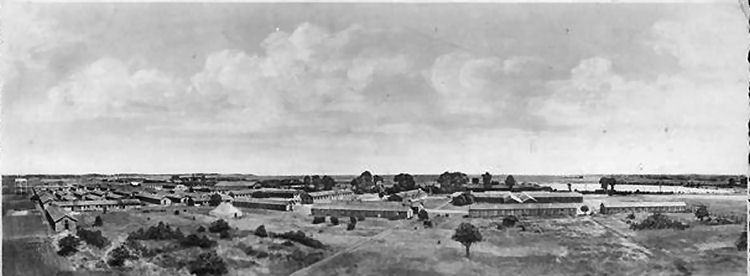
The camp as it looked in 1940 (Image: Erich Peritz)
A transit camp.
In 1939, as anti-Semitism in Germany worsened the council for German
Jewry advised that the formation of refugee camps in Britain was an
urgent matter to be addressed.
However, the Home Office had reservations, fearing that a 'pool of
refugees' would be formed in England unless there were proper measures
in place.
Eventually, a compromise was reached wherein an army camp in
Richborough would be transformed into a transit camp for refugees with
the means to eventually emigrate from Britain.
This camp was named Kitchener camp and there were strict rules for
prospective refugees.
Only those who could expect to move on 'within a reasonable period'
were eligible and all those who arrived in the camp had no rights of
British citizenship.
It was expected that they would move to another country within 12
months and in this time they were not permitted to work.
Despite these severe terms, countless Jewish refugees made the trip.
'Friendly aliens'
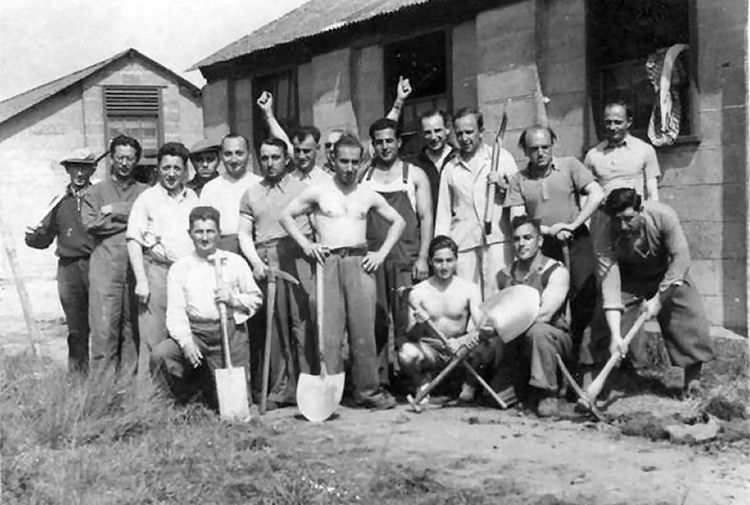
The camp was encouraged to be self sufficient (Image: Lothar Nelken).
The camp was operated by the Jewish Lads Brigade who built the
facility with the help of 100 refugees granted temporary visas by the
Home Office.
It was intended to cater to 5,000 people and was equipped with space
for agricultural and language training,
Those who lived in the camp were not confined and could leave the
camp with temporary permits.
The refugees were split into three categories depending on their
status.
The first class was simply 'interned', while class two were known as
'enemy aliens'.
These were refugees, who for some reason or another were known to the
authorities and so had to register with the police.
The last class were classified as "friendly aliens", and were allowed
to work through a labour exchange along with those in class two as long
as there 'were no English subjects able to take jobs for which there
were openings'.
The Kitchener soldiers.
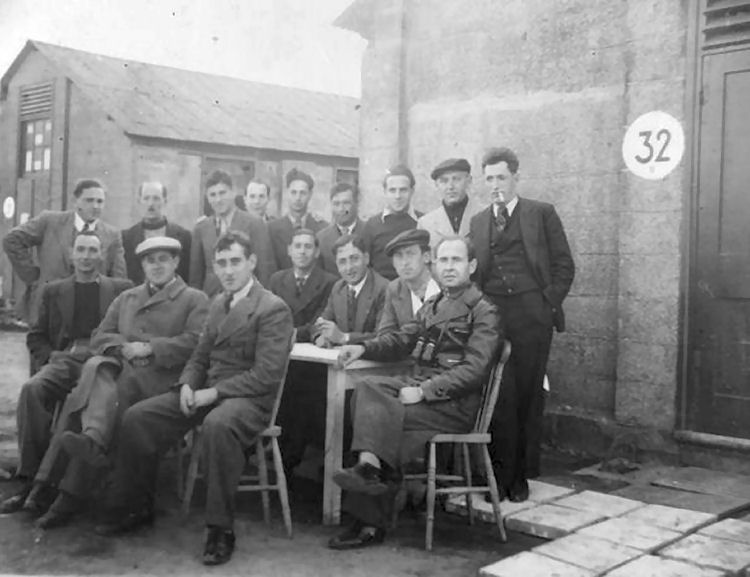
Many of the refugees at Kitchener Camp volunteered for national
service (Image: Hugo Heilbrunn).
At the camp's peak it had 4,000 refugees, a population 500 people
higher than the nearby town of Sandwich.
In total, there were around 65,000 refugees in Britain between
1939-40 and the pressure was beginning to show.
It was suggested that the Kitchener men might be called to help the
British war effort.
In total, 1,900 of the Kitchener men volunteered for national service
and were placed in either the Auxiliary Pioneer battalions, as
specialists and technicians or in general service in the army.
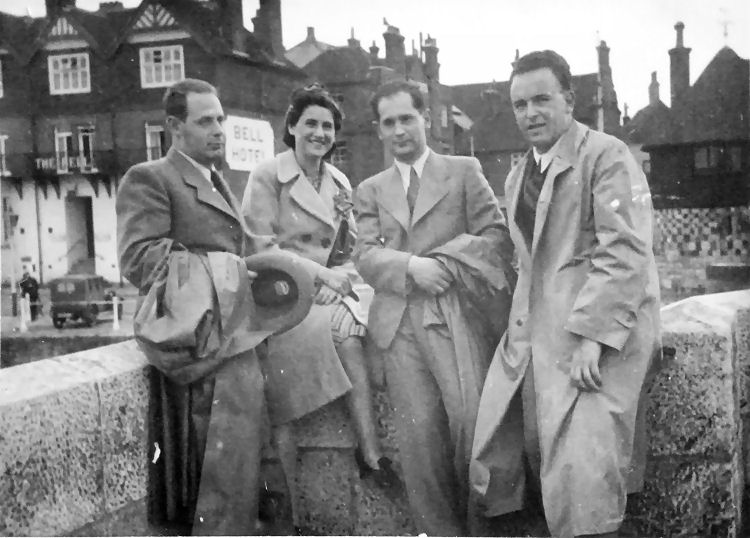
Above photo, kindly sent by Eric Elias (son of Eduard), showing
Eduard and Hans Elias and two unknowns.
In 2019 a blue plaque was erected on the Bell Hotel in Sandwich to
commemorate the camp.
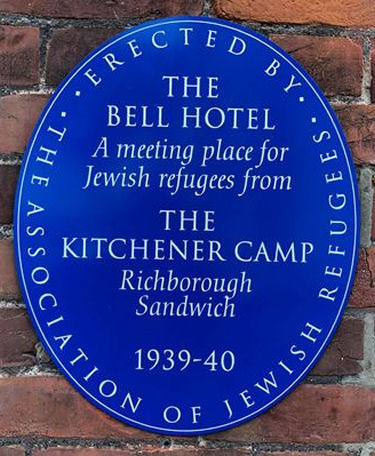
Sadly, with the onset of the Second World War public opinion began to
shift against refugees.
Following the Dunkirk evacuation, paranoia began to infest public
opinion leading some to suspect any German speaking refugee of being a
spy or a saboteur.
The camp was closed in 1940 and all those who had not volunteered for
the war effort were deported to Australia or Canada.
|
LICENSEE LIST
REVELL John 1660s+
CURLING Kirby Mr 1768+

HARRISON Sarah Mrs Sept/1791
FRIDAY John Sept/1791-98+

MEAD Thomas 1821-28+

MATTHEWS Thomas & MALYON Mary 1832-39+
 
MATTHEWS Thomas 1840+

MATTHEWS Esther 1841+ (age 35 in 1841 ) )
 SQUIRE Thomas 1842-44
SQUIRE Thomas 1842-44
MOLYNEUX William 1847-51+ (age 53 in 1851 ) )

MOLYNEUX & HADLOW 1855

MOLYNEUX William 1858+

WANSTALL R 1862+

DRAY ???? Mr July/1866
ADAMS William July/1866+
BURCH John 1872-74+
 
FILMER John James 1878-82+
 
JONES Jane A Mrs 1891
 (Manageress age 34 in 1891
(Manageress age 34 in 1891 ) )
CARPENTER Miss Annie L (Manageress) 1899+

JOYCE Mr J to Aug/1904+

 GOSLIN Sidney James after 1934
GOSLIN Sidney James after 1934
HOMFRAY H W R 1961+
FRANKS Peter A 1974+

THE MANAGER 2012+
https://pubwiki.co.uk/BellHotel.shtml
 From the Pigot's Directory 1823 From the Pigot's Directory 1823
 From the Pigot's Directory 1828-29 From the Pigot's Directory 1828-29
 From the Pigot's Directory 1832-33-34 From the Pigot's Directory 1832-33-34
 From the Pigot's Directory 1839 From the Pigot's Directory 1839
 From the Pigot's Directory 1840 From the Pigot's Directory 1840
 From Bagshaw Directory 1847 From Bagshaw Directory 1847
 From Melville's Directory 1858 From Melville's Directory 1858
 From the Post Office Directory 1855 From the Post Office Directory 1855
 From the Kelly's Directory 1862 From the Kelly's Directory 1862
 From the Post Office Directory 1874 From the Post Office Directory 1874
 From the Kelly's Directory 1874 From the Kelly's Directory 1874
 From the Post Office Directory 1878 From the Post Office Directory 1878
 From the Post Office Directory 1882 From the Post Office Directory 1882
 From the Post Office Directory 1891 From the Post Office Directory 1891
 From the Kelly's Directory 1899 From the Kelly's Directory 1899
 Library archives 1974 Library archives 1974
 Kentish Gazette Kentish Gazette
 Census Census
|

























